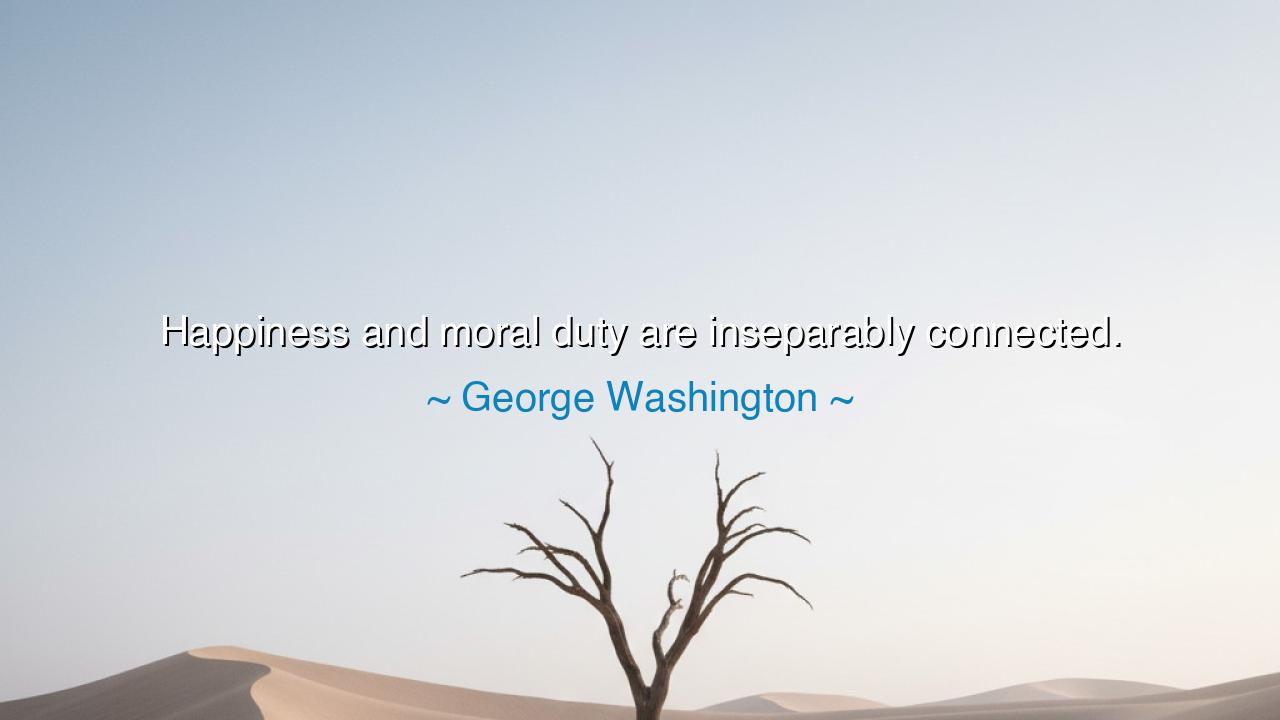
Happiness and moral duty are inseparably connected.






The Father of a Nation, George Washington, once wrote, “Happiness and moral duty are inseparably connected.” These words, though few, hold the weight of centuries — for they speak to the eternal law that governs both the soul of man and the destiny of nations. In this single phrase, Washington revealed a truth that stands at the heart of civilization itself: that true happiness cannot exist without virtue, and that a life guided by moral duty is the only life that leads to peace within and harmony without. It is a truth the ancients knew, the saints proclaimed, and the founders of free nations built their dreams upon.
Washington did not speak these words as a philosopher sitting in the comfort of study, but as a man who bore the burdens of leadership, sacrifice, and the fate of a newborn republic. Having led armies through the frost of Valley Forge and carried a nation upon his shoulders through its uncertain birth, he knew that duty — that stern and sacred word — is the price of all noble joy. He had seen how ambition without morality breeds tyranny, how freedom without conscience decays into chaos. To him, happiness was not pleasure or comfort, but the deep satisfaction of a soul that has done what is right, even at great cost.
This truth echoes through history. The ancient Greeks spoke of eudaimonia — the flourishing of the soul that comes only when one lives in accordance with virtue. So too did Washington, in his age of enlightenment and reason, see that personal happiness and civic health are bound together by the same golden chain of moral integrity. When individuals fulfill their duty — to themselves, to their families, to their communities, and to their Creator — they bring light not only to their own lives but to the world around them. A people who live without duty may pursue pleasure, but they will never know joy; they may gain riches, but they will never gain peace.
Consider the life of Abraham Lincoln, another leader forged in the fire of hardship and moral struggle. Lincoln’s heart was burdened by the weight of war, by the deaths of thousands, by the haunting question of right and wrong in a divided land. Yet even in his suffering, he found meaning. He once said that his greatest desire was “to do the right as God gives me to see the right.” In that moral clarity — that unwavering devotion to duty — he found not comfort, but a profound and enduring happiness: the peace that comes from conscience fulfilled. So it is with every soul that walks the path of righteousness — duty may bring sorrow, but never emptiness.
Washington’s words remind us that moral duty is not a chain that binds, but a compass that frees. It gives direction to freedom, purpose to ambition, and light to the journey of life. The man or woman who seeks happiness apart from duty chases shadows, for joy that is divorced from virtue turns quickly into vanity. But when one’s life is guided by principles — honesty, courage, gratitude, compassion, and justice — then happiness flows not from circumstance, but from character. Such happiness is unbreakable, for it is rooted in the eternal order of things.
Look around the world today, and you will see the consequences of forgetting this truth. Where greed replaces duty, nations falter. Where selfishness triumphs over service, families collapse. Where pleasure is worshipped above virtue, the soul withers. The ancients taught, and Washington reaffirmed, that the strength of a people lies not in their wealth or weapons, but in the moral fiber of their hearts. The citizen who honors duty strengthens the state; the leader who lives by virtue uplifts generations yet unborn.
And so, my child, learn this well: do not seek happiness as a prize, but as a companion of duty. When the world tempts you with ease, remember that joy is earned through effort. When doubt whispers that goodness brings no reward, recall that the greatest happiness is the quiet knowledge that you have done what is right. Live with honor, act with integrity, and hold fast to your moral duty, even when the road is hard. For as Washington taught, happiness does not lie in what we take, but in what we give — in the peace of a heart that has fulfilled its sacred obligation to truth, to virtue, and to life itself.
Then, and only then, will you know the highest joy — the joy that cannot be bought, the joy that endures beyond the grave — the happiness born of moral duty, the harmony between the will of man and the will of Heaven.






AAdministratorAdministrator
Welcome, honored guests. Please leave a comment, we will respond soon